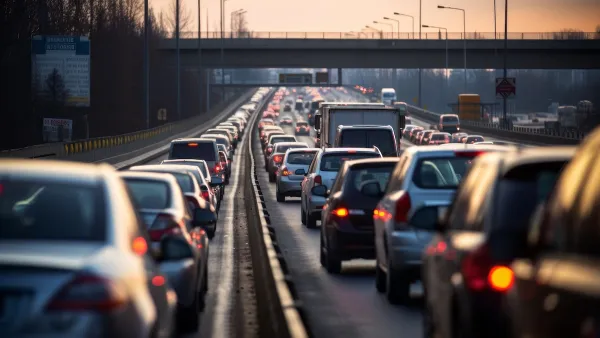Although transport planners consider traffic congestion economically harmful, economic productivity tends to increase with congestion and decline with increased road supply. This paradox can be explained by more nuanced analysis of accessibility.
If you think this sounds paradoxical, so does the study’s author, Todd Litman of the Victoria Transport Institute. But he also offers several reasons why it’s so.
For one thing, decisions to build roads or subsidize them by not charging users tends to come at the expense of other access options, things such as densification so people need not travel so far, or transit that provides more bang for the buck. These kinds of decisions are often based on politics, thus defying efficient market principles and undermining productivity.
As well, car travel is expensive. This means it increases costs borne by industry, and also sucks plenty of money from household budgets. Much of this money goes to car manufacturers outside the region or the country.
Litman concedes motor vehicle travel is economically important. “It delivers raw materials to producers, goods to markets, employees to work, students to schools, and customers to markets. All else being equal, an increase in transport system efficiency should increase productivity.”
However, cars and trucks aren’t the only aspects of transport systems, only the most visible and costly.
FULL STORY: Don Cayo: Congestion may signify better productivity, not worse

Maui's Vacation Rental Debate Turns Ugly
Verbal attacks, misinformation campaigns and fistfights plague a high-stakes debate to convert thousands of vacation rentals into long-term housing.

Planetizen Federal Action Tracker
A weekly monitor of how Trump’s orders and actions are impacting planners and planning in America.

San Francisco Suspends Traffic Calming Amidst Record Deaths
Citing “a challenging fiscal landscape,” the city will cease the program on the heels of 42 traffic deaths, including 24 pedestrians.

Defunct Pittsburgh Power Plant to Become Residential Tower
A decommissioned steam heat plant will be redeveloped into almost 100 affordable housing units.

Trump Prompts Restructuring of Transportation Research Board in “Unprecedented Overreach”
The TRB has eliminated more than half of its committees including those focused on climate, equity, and cities.

Amtrak Rolls Out New Orleans to Alabama “Mardi Gras” Train
The new service will operate morning and evening departures between Mobile and New Orleans.
Urban Design for Planners 1: Software Tools
This six-course series explores essential urban design concepts using open source software and equips planners with the tools they need to participate fully in the urban design process.
Planning for Universal Design
Learn the tools for implementing Universal Design in planning regulations.
Heyer Gruel & Associates PA
JM Goldson LLC
Custer County Colorado
City of Camden Redevelopment Agency
City of Astoria
Transportation Research & Education Center (TREC) at Portland State University
Jefferson Parish Government
Camden Redevelopment Agency
City of Claremont




























